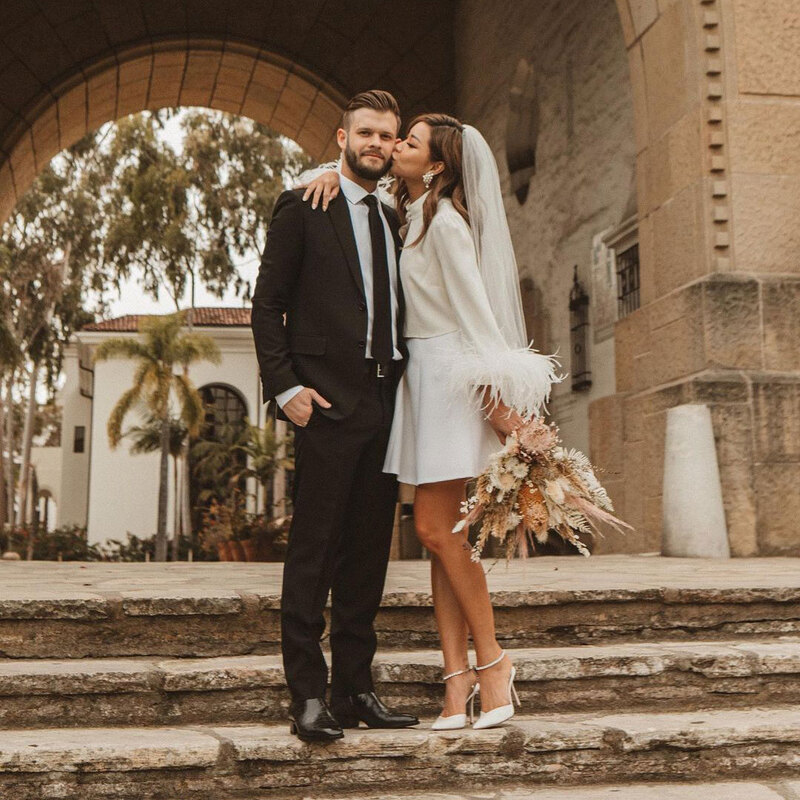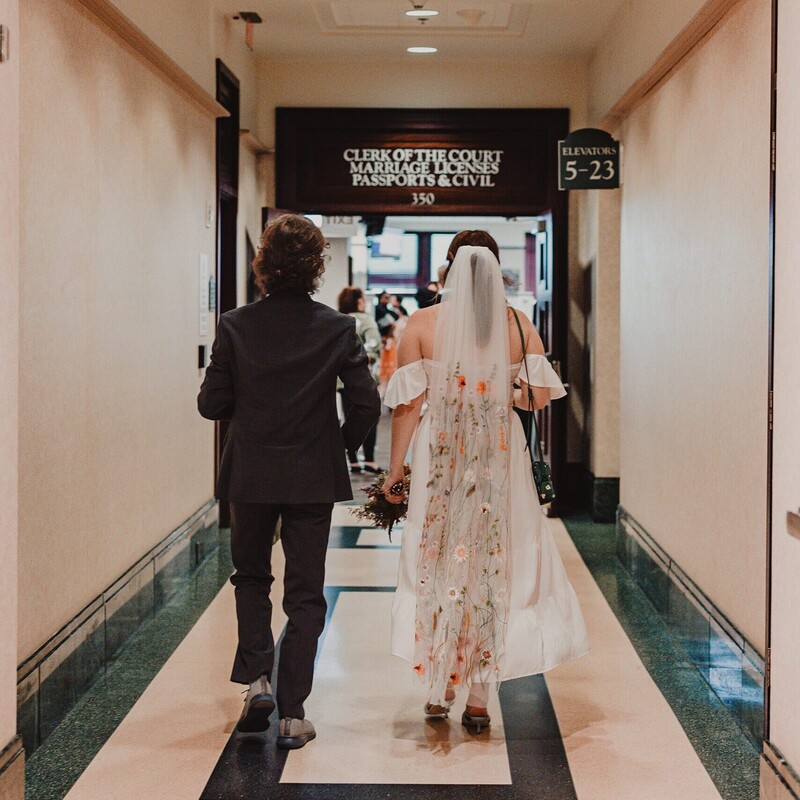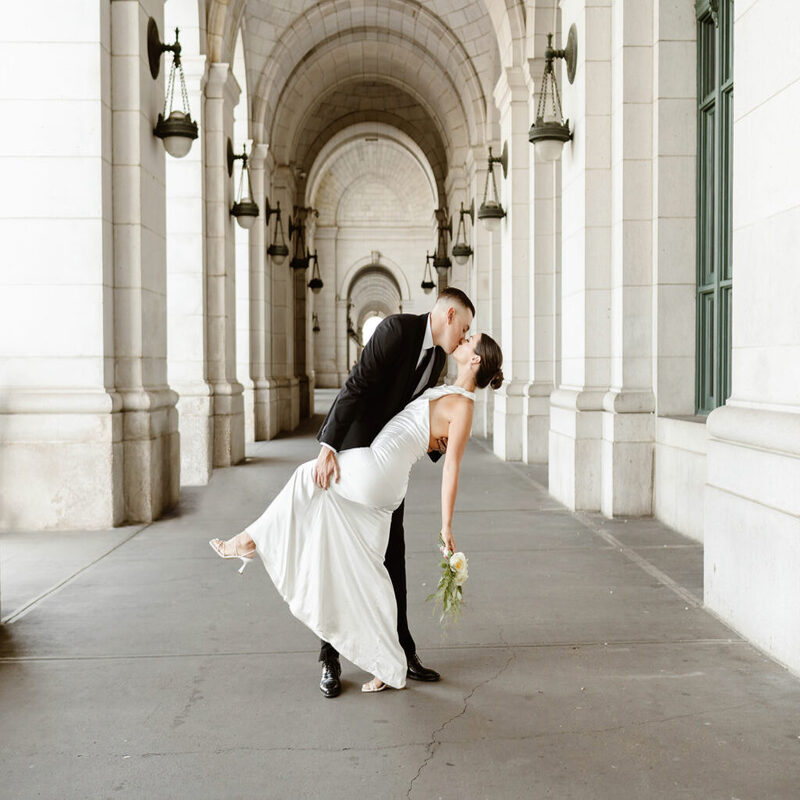Introduction to Courthouse Weddings
Courthouse weddings offer a unique, intimate way to get married. This choice fits those looking for a simpler, more affordable option. Unlike traditional weddings with their large guest lists and fancy venues, a courthouse wedding typically involves a small group. It happens in a governmental building, like city hall. These weddings focus on the couple’s commitment without the fuss of big celebrations. Many find the minimalist approach and historic buildings appealing. It suits modern tastes, combining charm and practicality. In this blog, we’ll guide you through how does a courthouse wedding work, what to plan for, and how to make it special.

The Rise in Popularity of Courthouse Marriages
Courthouse marriages are becoming more popular. This trend is driven by couples seeking simplicity and cost savings. Three main factors explain this rise in popularity:
- Cost Efficiency: Traditional weddings often cost thousands of dollars. A courthouse wedding work, on the other hand, can be significantly cheaper. Couples save on venue, attire, and other pricey elements of a big wedding.
- Less Stress: Planning a wedding takes a lot of courthouse wedding work. It involves coordinating with vendors, managing guest lists, and more. Courthouse weddings are much simpler to arrange. They appeal to couples wanting fewer hassles.
- Minimalism Trend: The minimalism movement is influencing choices. It encourages focusing on what matters most. Courthouse weddings embody this idea. They boil the event down to its essence: the couple’s love and commitment.
- Speed and Convenience: Some partners want to get married quickly. A courthouse wedding makes this possible. There’s usually no need for long engagements or extended planning periods.
- Intimacy: A smaller venue means a smaller guest list. This allows for an intimate ceremony. Only the closest family and friends attend. This creates a meaningful and personal experience.
- Architectural Beauty: Many courthouses boast historical and architectural charm. Couples can still have a beautiful backdrop for their special day.
In summary, courthouse marriages are on the rise. They appeal to modern couples who want a simpler, cost-effective way to tie the knot. They also offer a quick, low-stress path to marriage with the beauty of historic settings. This makes them an attractive alternative to traditional weddings.
Planning Your Courthouse Wedding: Steps and Tips
Planning a courthouse wedding work can be exciting yet straightforward with the right steps. Here’s what you need to do:
- Research Legal Requirements: Check the specific legalities of your location. Gather information on marriage licenses, waiting periods, and identification needed.
- Set a Date: Schedule your ceremony with the courthouse well in advance. Some places require bookings around two months out, so plan early.
- Limit Your Guest List: Courthouse weddings typically involve a smaller audience. Decide on who you want there to witness your commitment.
- Choose Outfits: Select attire that reflects your personal style. Whether you opt for formal or casual, wear what makes you happy and comfortable.
- Coordinate Logistics: Communicate with guests and arrange necessary details with the courthouse, like document submissions or decoration policies.
- Incorporate Personal Touches: Personalize your ceremony with custom vows or meaningful accessories. Don’t forget to check with the courthouse what’s allowed in advance.
- Hire a Photographer: Even simple weddings need to be remembered. Find a photographer who knows the courthouse setting to capture your moments.
- Plan Your Post-Ceremony: Decide if you want a reception or intimate gathering after the ceremony. Consider local restaurants or a laid-back home event.
- Confirm Witness Availability: Most locations need at least one witness. Make sure they are available and understand their role.
- Prepare for the Big Day: Collect all required documents, reconfirm appointments, and get a good night’s sleep before your wedding day.
By following these steps and tips, you’ll ensure your courthouse wedding is well-organized and as stress-free as possible. Embrace the simplicity and focus on the joy of marrying your best friend. Next, we’ll explore what the big day looks like at the courthouse.

The Big Day: What to Expect at the Courthouse
Your wedding day is special, even at a courthouse. Here’s a simple guide to what to expect:
- Arrival and Check-in: Get to the courthouse early. Bring your ID and marriage license. You’ll check in, just like at the doctor’s office.
- Limited Decor: Courthouses have rules about decorations. Expect minimal decor, but the setting often has its own charm.
- Intimate Ceremony: The ceremony will be short, often under 30 minutes. It will be small and personal, with only close family and friends.
- Exchange Vows: You’ll say your vows before a judge or magistrate. It’s a legally binding commitment, made in a simple setting.
- Witnesses: You’ll need at least one witness to sign the marriage certificate. Choose someone meaningful to both of you.
- Photography: Some courthouses allow photos inside. Others don’t. Know the rules ahead of time, and plan for photos outside if needed.
- Simple Logistics: Courthouses are hassle-free. They handle the paperwork and ceremony details for you.
- Celebration: After the ceremony, you might go for a meal or drinks. Planning a simple reception is optional, but can add to the day.
- Immediate Legality: Your marriage is official right away. There’s no waiting period after the ceremony.
Remember, a courthouse wedding focuses on the bond between you and your partner. It strips away the extras for a day that’s all about love and commitment.
Personalizing Your Courthouse Ceremony
While courthouse wedding work known for their simplicity, there’s plenty of room to add personal touches. Here are some ideas to personalize your courthouse ceremony:
- Custom Vows: Write your own vows to share during the ceremony. This can make your moment more intimate and memorable.
- Special Attire: Choose outfits that represent you. From traditional wedding dresses to casual attire, wear what feels right.
- Rings and Accessories: Select rings that have personal meaning. You can also add simple accessories like a family heirloom.
- Decorations: Some courthouses allow small decorations. Check beforehand and consider bringing items like flowers or photos.
- Music and Readings: If allowed, bring a music player for a special song, or have a reading that’s significant to you both.
- Photographer: A professional photographer can capture your unique ceremony. Look for one experienced in courthouse settings.
By focusing on these details, you can ensure your courthouse wedding feels as special and personalized as any other wedding ceremony.
After the ‘I Do’: Celebrating Post-Ceremony
After your courthouse wedding, it’s time to celebrate. Your ceremony was intimate, but you can still share your joy. Here are ways to make post-ceremony special:
- Intimate Gatherings: Host a small reception. A lunch or dinner at your favorite restaurant works great. The setting can be informal. The focus is on celebrating with those you love.
- Photography Session: Plan a photo shoot. Local parks or scenic spots can provide a beautiful backdrop. Capture those first moments as a married couple.
- Announce Your Union: Share your marriage news with a wider circle. Create a digital announcement or send out cards. Social media platforms can also spread the good news.
- Plan a Future Event: Consider a larger party down the line. A casual barbecue or a formal reception can be arranged later. This lets you celebrate with more friends and family.
- Personalized Touches: Make the post-ceremony unique. Include a special toast, a custom cake topper, or a playlist of songs you both love.
- Thank-You Notes: Send out thank-you cards. Show gratitude to guests and vendors. These small gestures can mean a lot.
Remember, the way you celebrate should reflect your personalities. The important thing is to cherish these moments with your partner and loved ones.

Legalities and Logistics of Courthouse Nuptials
Courthouse weddings need careful legal and logistical planning. It’s not just about showing up on your big day. There are specific steps and requirements every couple must follow. Here’s what you should know.
Understand the Marriage License Process
Research is key. You must know your area’s rules for marriage licenses. Different places have varied laws. Obtain a license before your wedding day. Await periods may apply.
Booking Your Ceremony Date
Courthouse ceremonies require an appointment. Contact the local courthouse early. Schedule your wedding date about two months in advance. Times fill up quickly, so be prompt.
Pre-Wedding Legal Requirements
Check for pre-wedding rules at your courthouse. You might need valid identification, divorce decrees, or blood tests. Prepare all essential documents beforehand.
The Role of Witnesses
Witnesses are often mandatory. They must be over 18 and have valid ID. They’ll sign your marriage certificate. Choose someone close to you both.
Day-of Ceremony Checklist
Arrive with your partner early. Bring your license, IDs, and any needed fees. Check courthouse photo policies. Some allow pictures, others may not.
Legal Binding and Post-Wedding Paperwork
A judge or court clerk often conducts the ceremony. After, your marriage is legally valid. You may need additional steps. File for a certified marriage certificate afterwards.
Knowing these facts ensures a smooth courthouse wedding. Prepare well, follow the legal steps, and your wedding will be a stress-free event. Remember, a courthouse wedding is not only a testament to love but also a legal commitment. Make sure to address all aspects diligently.
Budget-Friendly Benefits of Courthouse Weddings
Choosing a courthouse wedding can be kind to your wallet. Let’s break down the cost-saving advantages:
- Low Venue Costs: Courthouses charge little to no fees for ceremonies. This is much cheaper than traditional venues.
- Simple Attire: You can wear casual clothes or a less expensive dress. Fancy outfits are not a must.
- Smaller Guest List: Fewer guests mean less money spent on invites, seats, and meals.
- Minimal Decorations: The need for elaborate decor is low. The courthouse often provides a dignified backdrop.
- No Big Reception: You can skip a costly, large-scale party. A small gathering elsewhere will do.
- Less Planning Costs: You won’t need a wedding planner for a simple courthouse event. This can save you thousands.
- Lower Photography Fees: With a shorter event, you pay for fewer hours of professional photography.
- Inexpensive Rings: With a low-key wedding, you can opt for budget-friendly rings.
- Fewer Miscellaneous Expenses: Invites, party favors, and transport costs are drastically reduced.
Your courthouse wedding can still be memorable and beautiful without breaking the bank. It’s all about marrying your best friend, not spending all your savings. Embrace the simplicity, save money, and start your married life with financial peace of mind.
Alternatives and Extensions to Courthouse Wedding Work
For couples considering different options or adding to their courthouse wedding, alternatives and extensions offer flexibility.
Choose a Different Small Venue
If a courthouse doesn’t fit your style, small venues like local gardens or historical homes can also provide an intimate setting. These can be just as budget-friendly while offering a personal feel.
Plan a Post-Ceremony Celebration
After the official courthouse vows, you can host a larger event. This could be a reception, a party at home, or a casual gathering at a favorite spot.
Combining with a Religious Ceremony
Some couples follow their legal courthouse vows with a religious ceremony. This honors traditions and includes a wider circle of family and friends.
Destination Ceremony Afterward
An option is to have a legal courthouse wedding first. Later, plan a destination ceremony or renewal of vows for a special experience.
Live Streaming for Distant Loved Ones
Use technology to your advantage. Live stream your courthouse wedding work for friends and family who can’t attend.
Each alternative or extension offers a way to make your wedding experience unique to you and your partner. They allow you to celebrate in ways that may include more people or add a personal touch that the courthouse alone might not provide. Whichever path you choose, your wedding day can be tailored to reflect your shared values and love story.
